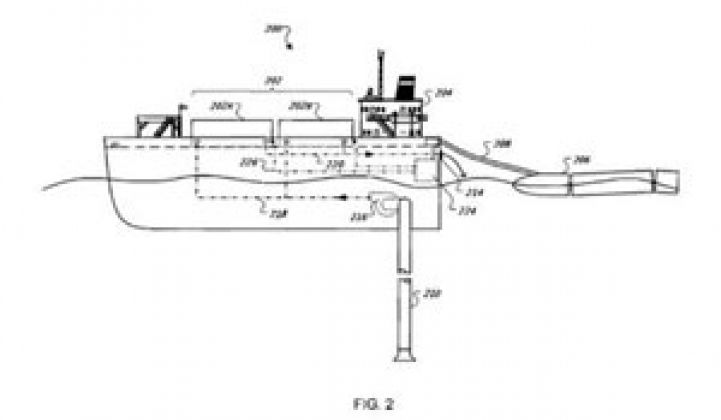CORRECTION: An earlier version of this story incorrectly stated that Google's patent had been approved.
Some brilliant minds at Google must have looked out at the vast Pacific Ocean not far from its headquarters in Mountain View, Calif. at one time and wondered: How can we harness ocean power to benefit mankind?
The answer, apparently, lies in a patent application filed with the U.S. Patent and Trademark Office. The patent outlines engineering concepts for constructing a giant floating data center offshore that would be cooled and powered by ocean waves and currents.
It'll be some time before Google can stake out a piece of watery real estate to build the data center -- if it ever does. Harvesting ocean power is largely confined to pilot projects around the world. Engineering equipment that can efficiently covert energy and withstand saltwater corrosion and other weather elements are some of the major challenges facing the project.
But when much-heralded companies such as Google come up with fanciful concepts, they attract a lot of attention. Apple, for example, created a furor of speculations earlier this year when its employees filed for a patent to put solar cells inside portable gadgets (see Charge Your iPhone In The Sun).
Google has patented the idea for a data center that draws electricity from systems using energy generated from waves, tides and/or currents. The company specifically talks about using Pelamis machines, developed by Scottish firm, Pelamis Wave Power, as a way to build the power systems.
Pelamis machines are giant, linked semi-submerged cylindrical parts that produce electricity when wave motions drive a hydraulic system that includes electrical generators. Pelamis has built a 2.25-megawatt wave energy farm off the coast of Portugal.
The search giant figures that an ideal wave system would involve deploying 40 Pelamis machines over a square kilometer, enough to produce 30 megawatts of electricity. The whole setup could be located three to seven miles from shore, in 50 meters to 70 meters (164 feet to 230 feet) of water.
Google also envisions cooling its hard-working servers by pumping seawater through seawater-to-fresh-water heat exchangers. It would take wind turbines, however, to power the cooling systems, according to the patent.
The company may not be known for engineering ocean wave energy farms, but it's not unusual for the search giant to look for new and cheaper ways to power its data centers.
Google, which fancies itself a renewable-energy champion, has invested in geothermal power companies as well (see Google Funds Hot Rock Technology).
Sometimes, Google just wants cheap electricity – fast. The company caused a stir last year when it proposed building a coal-fired power plant in Iowa for a data center.
The data center doesn't need to be located in the ocean to make use of ocean energy, however. Google's patent mentions building data centers on land but close to the ocean-power generators.



